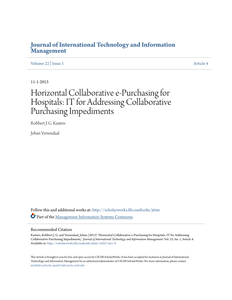Horizontal collaborative purchasing (HCP) has often been cited as a way for hospitals to address the challenges of the rising healthcare costs. However, hospitals do not seem to utilize horizontal collaborative purchasing on any large scale, and recent initiatives have had mixed results. Focusing on Dutch hospitals, in this paper we present major impediments for collaborative purchasing, resulting in a first component of our proposed electronic horizontal collaborative purchasing model for hospitals; as a second component it contains a collaborative purchasing typology. A first validation round with hospital purchasing professionals, described separately in Kusters and Versendaal (2011), confirmed four applicable purchasing types and fourteen salient collaborative purchasing impediments. The model is operationalized by including possible information technology (IT) solutions that address the specific fourteen impediments. This model is validated through methodological triangulation of four different validation techniques. We conclude that IT has the potential to support, or overcome, the impediments of HCP. The validation also reveals the need to distinguish between more processrelated, as opposed to social-related, obstacles; the immediate potential for IT solutions is greater for the process-related impediments. Ultimately, we conclude that the collaborative epurchasing model (e-HCP) and implementation roadmap can be used by healthcare consortia, branche organizations, partnering healthcare institutes and multi-site healthcare institutes as a means to help identifying strategies to initiate, manage and evaluate collaborative purchasing practices
DOCUMENT

The benefits of collaborative purchasing are many, yet in the healthcare sector, in particular at hospitals, it is still uncommon. In this paper we identify major impediments for collaborative purchasing, resulting in a first component of our proposed collaborative e-purchasing model for hospitals; as a second component it contains a collaborative purchasing typology. After analysis of a first validation round with hospital purchasing professionals, the results show four applicable purchasing types and fourteen collaborative purchasing impediments that are perceived as important for hospitals. The model is further extended by possible IT solutions, identified by experts, addressing the specific fourteen impediments. We conclude that the collaborative e-purchasing model can be used by healthcare consortia, branche organizations, partnering healthcare institutes and multi-site healthcare institutes as a means to help identifying strategies to initiate, manage and evaluate collaborative purchasing practices.
DOCUMENT

Paper for the WION - Werkgemeenschap Inkoop Onderzoek Nederland - 2015, 3rd version.Purchasing within Small and Medium-sized Enterprises (SMEs) is important for the overall SME firm performance. However, purchasing within SMEs is not the same as purchasing within larger organisations and there is limited conclusive research on how to improve the purchasing performance of SMEs. This article describes research done by four bachelor students on the purchasing function within four Dutch manufacturing SMEs.
DOCUMENT

Centre of Expertise, onderdeel van Hanze